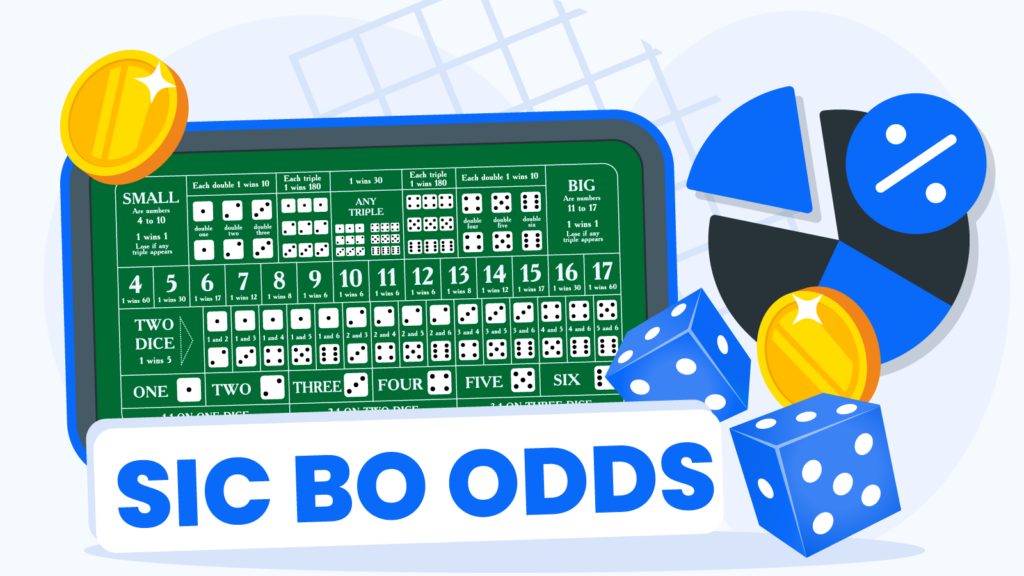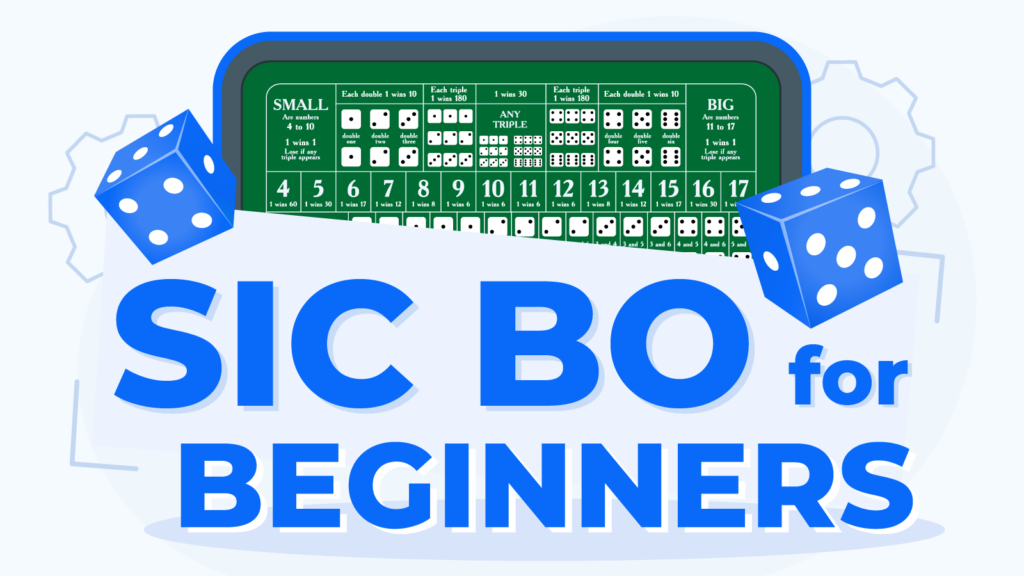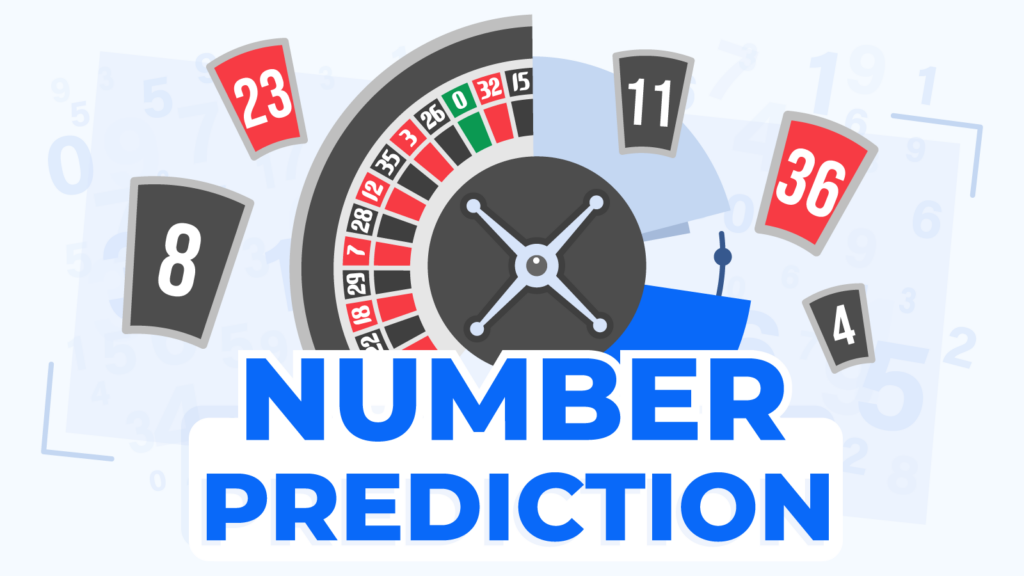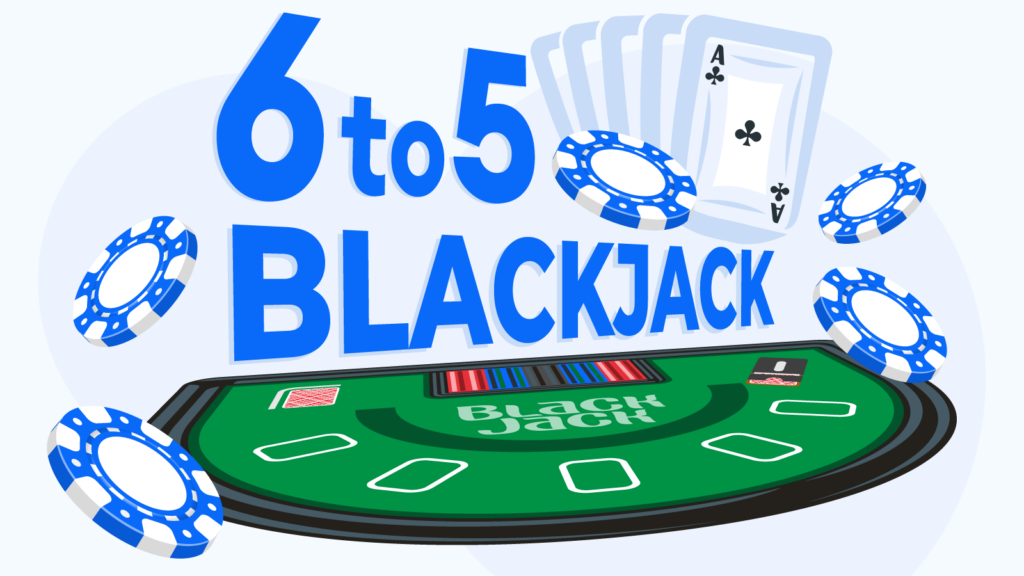
Expert Insights into 6 to 5 Blackjack: Strategy and Payout Guide
All the information in this page was checked by:
Every piece of information we present is rigorously verified by our team of experts using multiple credible sources, ensuring the highest level of accuracy and reliability.
We have paid partnerships with the online casino operators featured on our site. We may also earn commissions when users click on certain links. However, these partnerships do not affect our reviews, recommendations, or analysis. We remain impartial and committed to delivering unbiased gambling content. For more details, visit our Advertiser Disclosure page.
Think you’re playing standard blackjack? If you’re at a 6 to 5 table, you’re giving up extra winnings without even realizing it. Casinos love this rule—players shouldn’t. We’ll break down the numbers and show why this version of blackjack is one to avoid.
- The True Impact of 6 to 5 Blackjack Payouts: What You Need to Know
- Easy Ways to Calculate 6 to 5 Blackjack Payouts
- Why the 6 to 5 Blackjack Payout Chart is Essential for Players
- Comparing 6 to 5 vs 3 to 2 Blackjack: How It Affects Your Winnings
- Tips to Improve Your Odds in 6 to 5 Blackjack
- Is 6 to 5 Blackjack Worth Playing? Here’s What to Consider
The True Impact of 6 to 5 Blackjack Payouts: What You Need to Know
The rule describes the amount you receive when you have a Blackjack, depending on your staked funds. 6:5 Blackjack is a variant of the most crucial condition among the rules of Blackjack, regardless of the medium you play it in. In classic 3:2 Blackjack, you’ll win £15 if you bet £10. With the 6:5 rule, you’ll only win £12 for the same £10 bet. The difference is huge even when crunching small numbers – imagine the impact in the long run! This is informative for you as a player and dictates the statistical qualities that generate your odds of success and potential losses in the long run. The 6:5 payout rule is slowly becoming the standard for gambling in all forms, from Blackjack casino sites to brick-and-mortar casinos. The reasoning behind this advent is simple – tables with Blackjack’s 6:5 rule variations bring in more profits per customer.
Easy Ways to Calculate 6 to 5 Blackjack Payouts
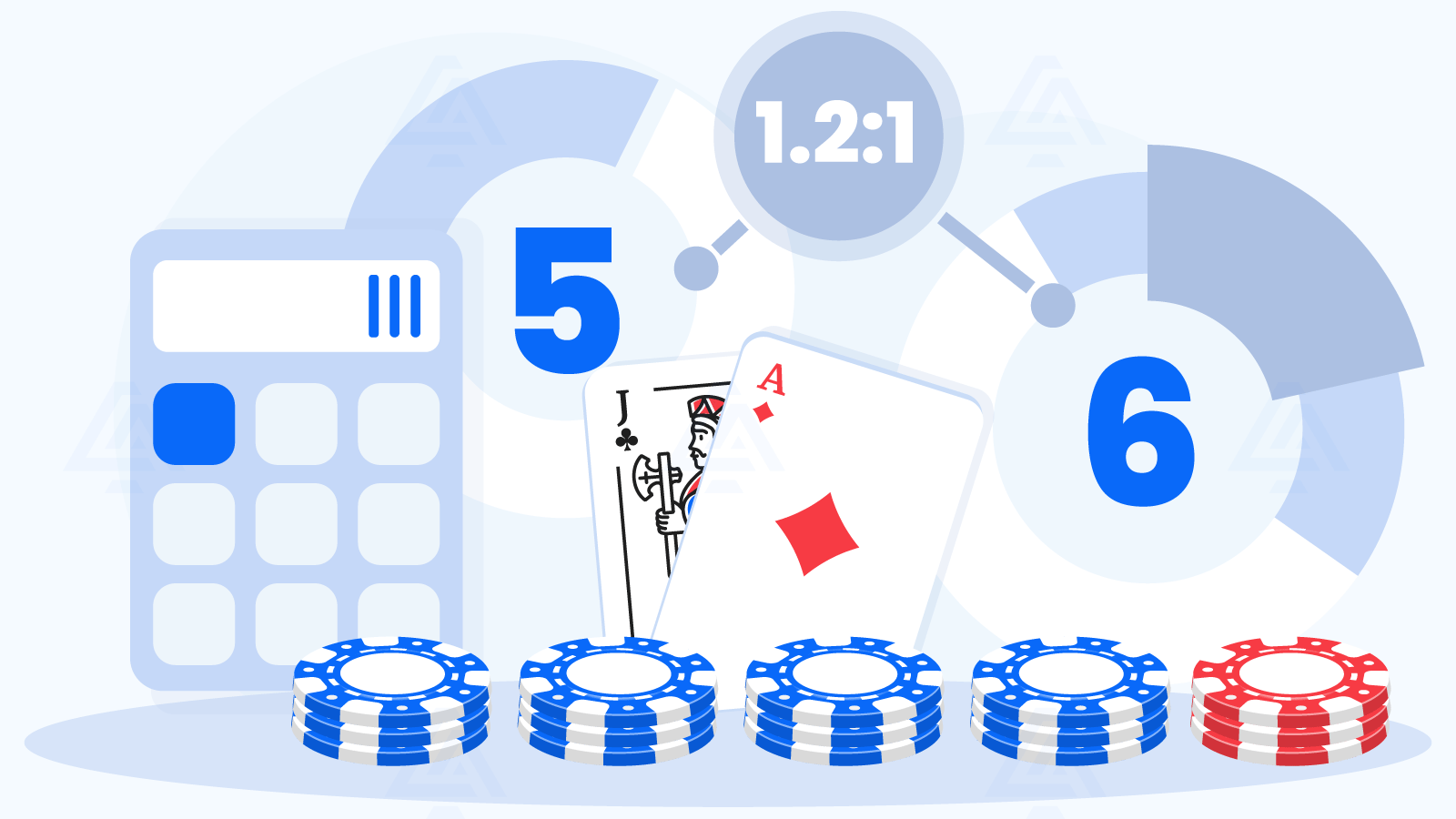
Steps to calculating the payout
- You take the amount you staked initially and divide it by 5
- You then multiply the resulting value by 6
- This new amount equals the payout you receive if you have a 21 hand
Alternative formulation for the payout
Instead of writing it as 6:5, Blackjack payouts can be simplified to a formulation that does not imply dividing your bet.
Tip
We can equivalently write 6:5 as 1.2:1. In this case, you can simply determine your payouts by multiplying your original stake by 1.2. While simpler, from an algorithmic point of view, 1.2 to 1 is harder to memorise. You should learn the standard calculating procedure, even with the extra step. Here is a flowchart for calculating the resulting payout amount to make you remember it more manageable.
6 to 5 Blackjack payout chart
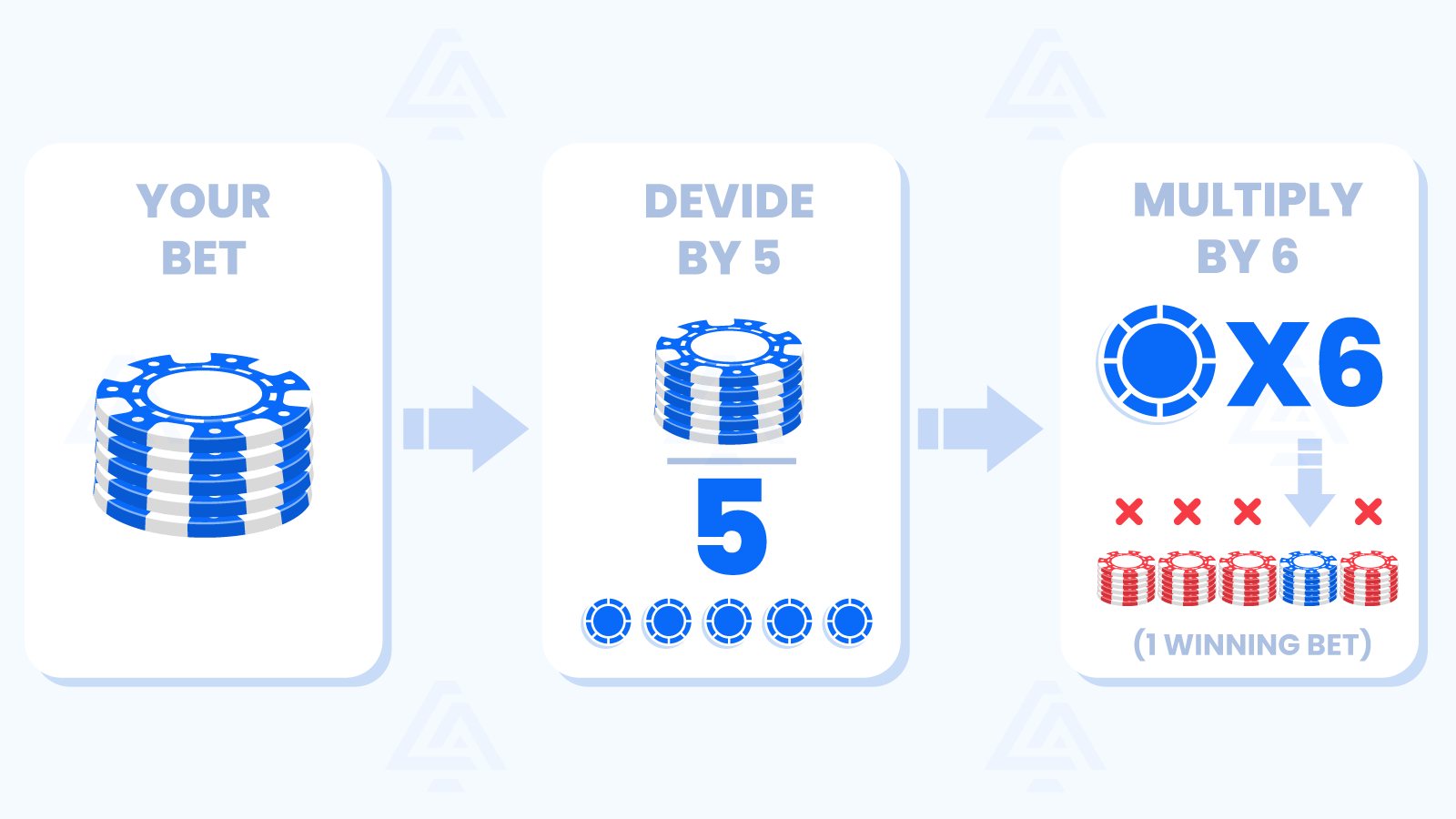
Here is how Blackjack pays 6:5 for £10
We assume that you initially stake £10 in a round. Once the dealer imparts your cards, your hand totals 21. Good job, you have won. As for how much, here is the previous algorithm in motion: you divide the £10 by five and get £2. Then you multiply the £2 by 6. Your eventual payout would be £12. This payout does not include the original stake that you also recover.
21 payout vs winning with standard hands
Winning with a hand valued under 21 generally has a 1 to 1 payout. Essentially, the payout matches your stake. In other words, for the £10 example, the payout for non-Blackjack wins is £10. Thus, a round in which your cards total 21 will always pay better. Here are more examples of possible payouts for a 21 hand when Blackjack pays 6:5.
6:5 Blackjack payout chart for various values
| Original bet | The payout |
|---|---|
| £1 | £1.2 |
| £2 | £2.4 |
| £5 | £6 |
| £10 | £12 |
| £15 | £18 |
| £20 | £24 |
| £25 | £30 |
| £50 | £60 |
| £100 | £120 |
| £150 | £180 |
| £200 | £240 |
| £500 | £600 |
| £1000 | £1200 |
How to tell 6 to 5 Blackjack tables from others?
You don’t even have to ask the dealer if a game has the Blackjack pays 6:5 rule. All games will have the 21-payout specified on the felt table.
Why the 6 to 5 Blackjack Payout Chart is Essential for Players

What does Blackjack 6 to 5 mean for your odds?
The 6:5 rule has a direct toll on the overall house edge, a statistical value that describes the fraction of your bets that the casino will keep in the long run.
Tips
- Online casino sites will sometimes replace the house edge with the return to player. However, you must remember that the RTP is the reverse of the house edge
- Here is an example. If the RTP of a game is 99.4%, you can simply subtract it from 100%, and you obtain the house edge, i.e., 0.6%
How the 5 to 6 Blackjack payout affects the house edge
The Blackjack 6:5 payout increases the house edge of standard versions by 1.359% per hand and 1.204% per wager. The resulting house edge from changing this rule alone is approximately 3.8 times the house edge per hand and wager. An increase in a game’s house edge means that, in the long run, and on average, the casino will retain more of your funds or statistically win more.
Other rules that affect Blackjack odds
| Game rules | House edge increase/decrease | Resulting house edge |
|---|---|---|
| Standard | 0% | 0.411% |
| 6:5 rule | +1.359% | 1.770% |
| Only double on hard 9-11 | +0.0903% | 0.504% |
| Only double on hard 10-11 | +0.175% | 0.586% |
| Only double on hard/soft 9-11 | +0.0903% | 0.504% |
| Early surrender against 10 | -0.161% | 0.250% |
| Full early surrender | -0.558% | -0.147% |
| No surrender | +0.077% | 0.488% |
| Resplit to 3 hands | -0.046% | 0.365% |
| Resplit to 4 hands | -0.055% | 0.356% |
| Hit split aces | -0.062% | 0.349% |
| Resplit aces | +0.121% | 0.532% |
| No double after split | +0.121% | 0.532% |
| Dealer hits on soft 17 | +0.199% | 0.610% |
| Dealer does not peek for 21 | +0.109% | 0.520% |
| Dealer peeks on ace | +0.1% | 0.511% |
| Peek with split bets lost | +0.027% | 0.438% |
| 6-card Charlie | -0.162% | 0.249% |
| 7-card Charlie | -0.01% | 0.401% |
Rules for the standard version
- Eight decks
- Double on any cards
- Late surrender
- No resplits and double after split
- Dealer stands on soft 17 and also peeks for Blackjack
- Blackjacks pay 3 to 2
- No Charlie bonus
Remember
Peeking with split bets lost is a standard occurrence of games on Playtech casinos, even earning the moniker of Playtech peek. The most significant negative effect on the house advantage occurs in the case of the Blackjack’s 6:5 rule, with the dealer hitting on soft 17 being a far second. On the other hand, being allowed the early surrender in Blackjack for any cards will give you the best advantage in the case of singular rules.
House edge effects visualised
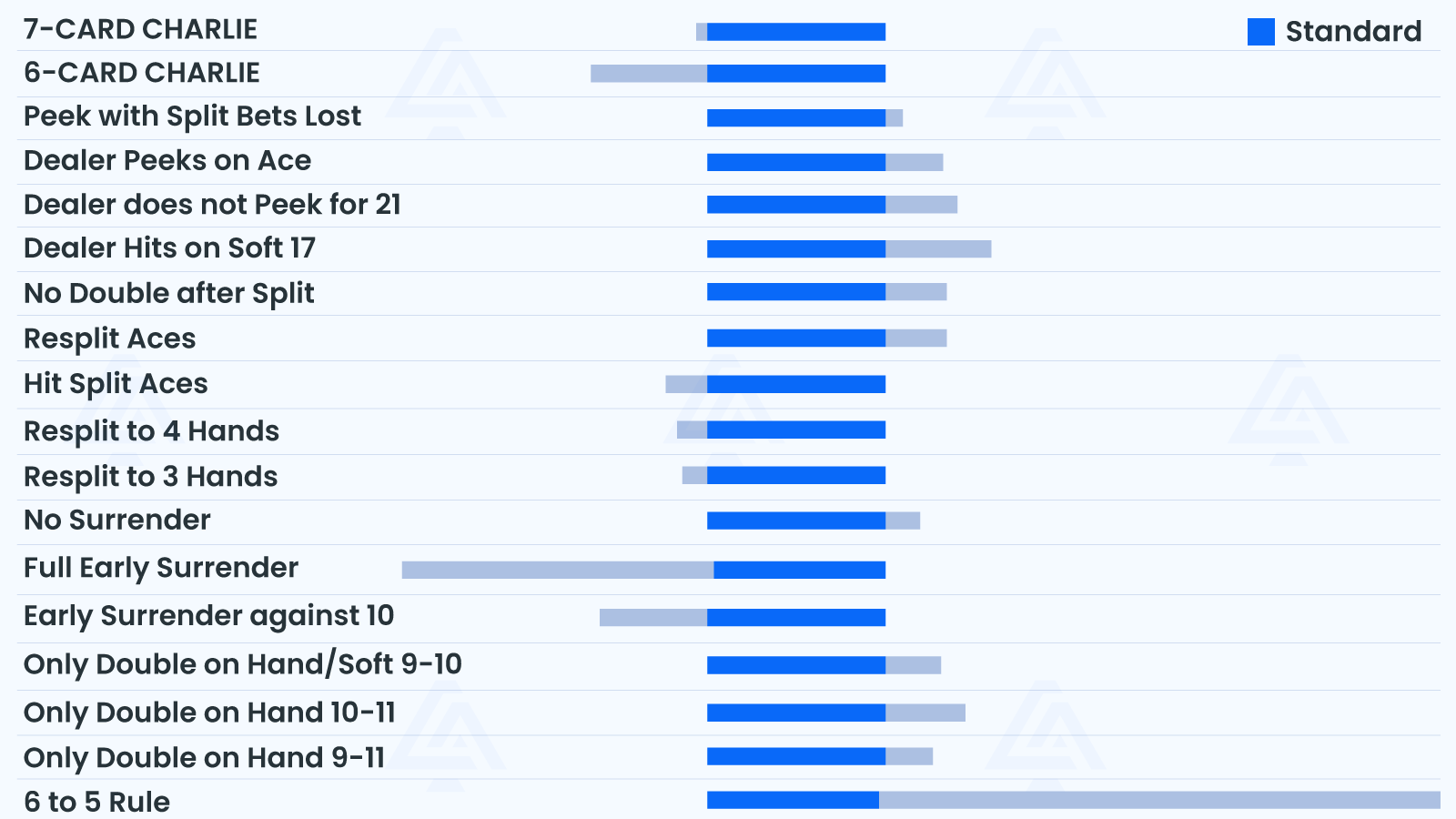
The number of decks also has an effect
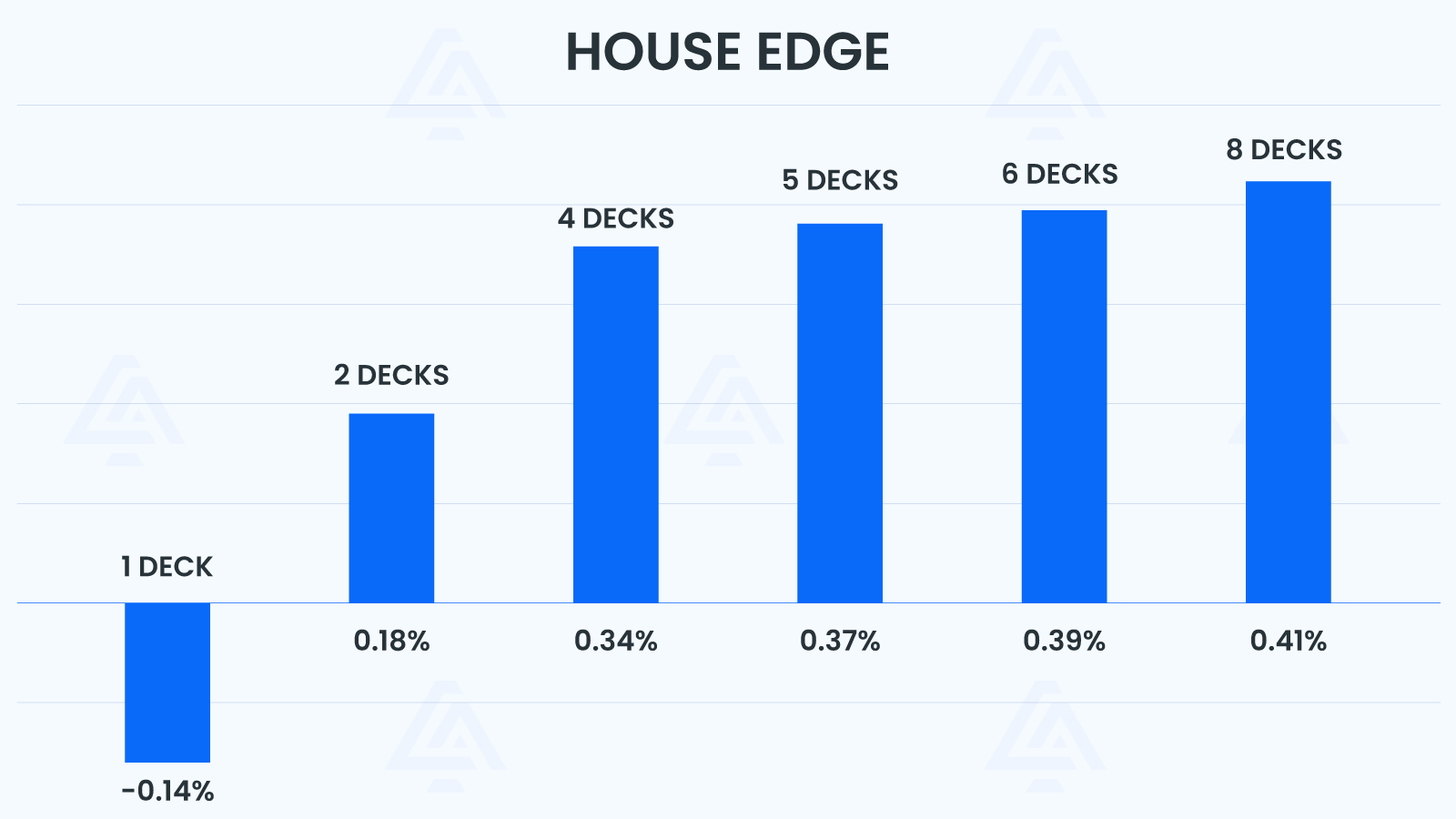
Comparing 6 to 5 vs 3 to 2 Blackjack: How It Affects Your Winnings
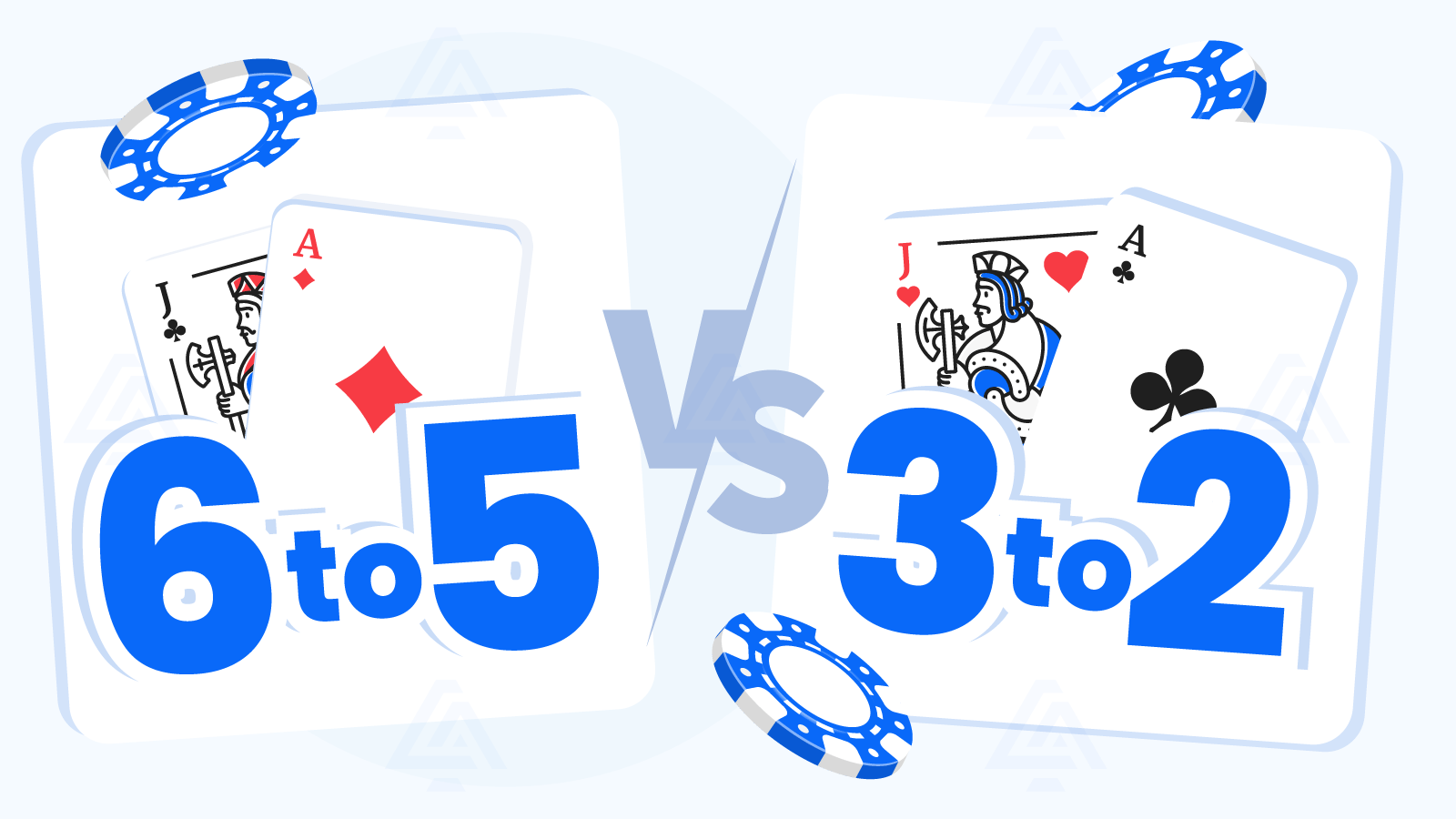
6:5 versus other payout versions
| Payout variations | Alternative ratio | House edge (standard rules) |
|---|---|---|
| 3:2 | 1.5:1 | 0.411% |
| 6:5 | 1.2:1 | 1.770% |
| 2:1 | 2:1 | -1.857% |
| 1:1 | 1:1 | 2.679% |
The 6:5 Blackjack payout is the second poorest situation. While not immediately evident, this fact becomes apparent as you convert to the “to 1” ratio and calculate the objective house advantage.
When the house advantage is relevant
In Blackjack’s case, the house edge is computable and relevant when you use the basic strategy.
Tips to Improve Your Odds in 6 to 5 Blackjack

- Consult the odds of Blackjack for bets and practices before playing
- Learn the basic strategy for the rule variation that you choose
- If better payouts for blackjacks are unavailable, check the contributions and other rules; try to select games with the best odds
- Use casino bonuses when available to increase playtime while limiting spending
- Control your spending and remember that all featured games offer an advantage to the casino operator
- Use betting systems, like the double down strategy, only once you understand them and their implications
How to increase your overall experience
- Pick legitimate casinos and try reading casino reviews before registering
- Assess the platform features and functionalities, such as the extended game catalogue, payment methods, and promotional policy
- See if the platform is currently hosting welcome bonuses
- Check other popular table games in baccarat, craps, or roulette sites
- Live casinos will provide the most immersive experience and multiple game types; try them out
- There are few no deposit bonuses usable on Blackjack and table games; read the policy and reviews before opting in
Is 6 to 5 Blackjack Worth Playing? Here’s What to Consider
The bottom line is that such games provide worse odds for players. The rule’s popularity is explicable only by the operators’ wish to limit player chances. While most developers will try to counterbalance the effects of this rule, it should become clear from the payouts chart that this specification has the heaviest toll on the house edge. While we can advise you to go for other game variations, you should freely decide on your own. Proceed with full knowledge of the facts, and use our research tips to enhance your odds and experience.




